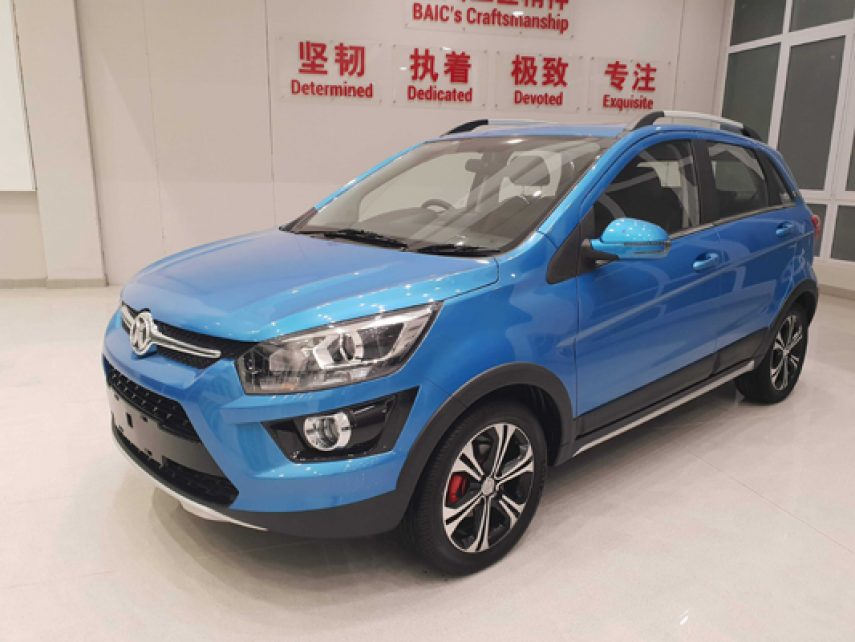CHINESE automaker BAIC will significantly ramp up the use of local materials and labour as its new Coega plant moves from its set-up phase into full scale production, with the first batches of its X25 compact SUV due to start rolling off the assembly line in the fourth quarter of 2018.
That was the assurance from BAIC Group Chairman Xu Heyi, speaking at an event recently to mark the completion of the R2-billion Phase 1 of the R11-billion plant.
The highlight of proceedings was when President Cyril Ramaphosa and his Chinese counterpart Xi Jinping unveiled the first-ever BAIC vehicle assembled on African soil live via video link from Centurion, where the two leaders were attending the BRICS summit.
Ramaphosa said he was “filled with pride” at the magnificent milestone. “We applaud each and every worker out there. This is conformation of the real working partnership between the People’s Republic of China and South Africa”.
The BAIC SA investment – one of 26 bilateral agreements, with a total value of R94 billion, signed in 2015 between SA and China – is the single largest investment in South Africa in 40 years.
The project is the result of a memorandum of understanding (MOU) between the South African government’s industrial policy implementation arm, the Industrial Development Corporation (IDC) and Chinese state-owned Global Fortune 500 company BAIC Group, which manufactures BAIC models as well as Hyundai and Mercedes-branded cars for the Chinese market through its Beijing Hyundai and Beijing Benz joint ventures agreements.
At the event, BAIC announced the completion of the semi-knocked-down (SKD) line and satisfactory progress on construction work streams of its plant located in the Coega Special Economic Zone (SEZ).
Phase 1 comprises a 4 200 m² office block, an assembly and body shop of 42 000 m², and robotic equipment. Construction will commence shortly on the 21 000 m² paint shop, scheduled to be completed by the end of 2019.
BAIC describes its new facility in Coega as “high standard, environmentally friendly and intelligent,” thanks to the use of “mature, advanced, low pollution and energy saving manufacturing technologies” and artificial intelligence (AI).
With 2018 marking the 20-year anniversary of bilateral trade, investment and economic relations between South Africa and China, the BAIC SA project is not only set to dramatically advance the economy of Nelson Mandela Bay through investment in the East, but also offers BAIC a strategic geographic manufacturing and export base to realize its global strategy.
Some 60% of vehicles manufactured at the BAIC SA plant are destined for export markets in Africa, the Middle East and Latin America, with the remaining 40% for the South African market. BAIC currently has 17 dealerships in South Africa and plans to announce further expansions.
At the event, Xu described the relationship between South Africa and China as one of “golden cooperation”, which ensures the realisation of prosperity through BRICS cooperation.
“The BAIC SA project advances both countries and is testimony to this week’s BRICS Summit theme which centers on inclusive growth and shared prosperity in the 4th Industrial Revolution,” the chairman added.
IDC CEO Geoffrey Qhena said the event will further redefine economic ties between South Africa and China. “Over and above this particular investment, we expect positive spin-offs in additional investments and job creation from the numerous local and foreign components manufactured in the supply chain.”
To date, 1 540 direct construction jobs were created following the ground-breaking ceremony of the BAIC plant in Coega in 2016. This is due to rise significantly in further phases of construction.
The company has also released forecasts on permanent employment in South Africa, with 120 people to be employed by the end of 2018, with further hirings due to take place once the paint plant is completed.
On the employment of local people, Xu said the company would undertake a comprehensive skills development and transfer programme and that he envisaged that locals would comprise between 90% and 95% of the plant’s employees.
In relation to Small, Medium and Micro-sized Enterprises (SMME) beneficiation, BAIC said that 73 SMMEs (51% black-owned CIDB grading 1 – 6) participated in various construction and other related work streams during Phase 1.
The total value contracts awarded to SMMEs in Phase 1 was R200 million.
Forthcoming projects such as the paint shop, landscaping, and other external works stream, due to be completed by the end of this year, will ensure BAIC reaching its SMME participation goal of 35% in Phase 1.
Turing to the use of local materials and parts, Xu said BAIC has over the last two years extensively engaged automotive South African component manufacturers and suppliers through a procurement and supply division.
“BAIC SA has successfully engaged and formed MOUs with the first group of local suppliers to develop our South African supply chains.” This year’s localised parts procurement plan will include 39 parts; mainly based on the production of accessories for interior parts, such as roof lining, carpets and seats, amongst others.
The BAIC announcement follows shortly after one by Mercedes Benz that it is to invest R10 billion into its Eastern Cape plant.

